Lasswell Harold D. The Political Writings of Harold D. Lasswell
Подождите немного. Документ загружается.

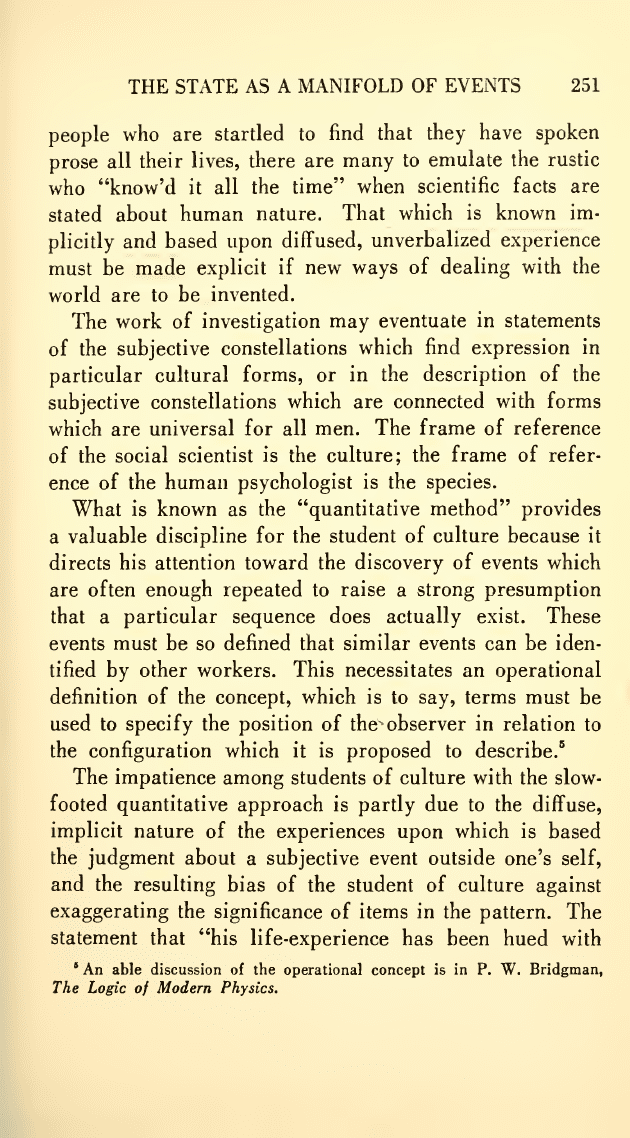
THE
STATE AS A
MANIFOLD OF
EVENTS 251
people
who are
startled
to
find
that they
have
spoken
prose
all
their lives,
there are
many
to
emulate the
rustic
who
"know'd
it all
the
time"
when
scientific facts are
stated
about
human
nature.
That
which
is
known
im-
plicitly and
based upon
diffused,
unverbalized
experience
must
be
made
explicit if
new ways
of
dealing with the
world
are to
be
invented.
The
work of
investigation
may
eventuate
in
statements
of
the subjective
constellations
which find expression in
particular
cultural forms,
or in
the description of the
subjective
constellations
which
are
connected
with
forms
which are
universal for all
men.
The frame of reference
of
the
social scientist
is the
culture; the frame of refer-
ence
of
the human
psychologist is the
species.
What is
known
as
the
"quantitative method"
provides
a
valuable
discipline for the
student of culture
because it
directs
his
attention
toward the
discovery of
events which
are often
enough repeated
to
raise
a
strong presumption
that
a
particular sequence does actually exist. These
events
must
be so
defined that similar
events
can be iden-
tified by
other workers. This necessitates
an operational
definition of the concept, which is
to
say, terms must
be
used to
specify the position
of the
observer
in relation
to
the configuration which it is proposed
to describe."
The impatience
among students of
culture
with the slow-
footed quantitative approach
is
partly due
to the diffuse,
implicit
nature of
the
experiences
upon
which
is
based
the
judgment
about
a
subjective event outside
one's self,
and
the resulting
bias
of the student of
culture
against
exaggerating
the significance
of
items in the
pattern. The
statement
that
"his life-experience
has been hued
with
*
An able discussion of the
operational
concept is in
P. W.
Bridgman,
The
Logic
of
Modem
Physics.
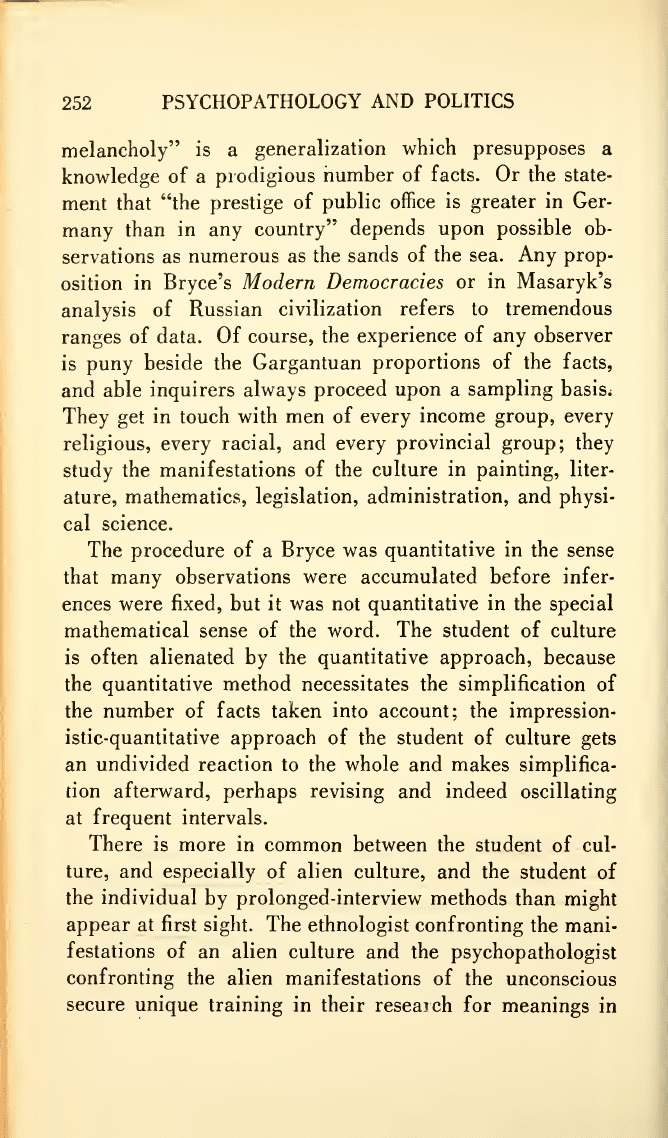
252
PSYCHOPATHOLOGY
AND POLITICS
melancholy"
is
a
generalization
which presupposes
a
knowledge
of
a
prodigious
number of facts. Or the state-
ment
that
"the
prestige
of
public
office is greater in Ger-
many
than
in any
country"
depends upon
possible
ob-
servations
as
numerous as
the
sands of
the
sea.
Any prop-
osition
in
Bryce's
Modern
Democracies
or
in
Masaryk's
analysis
of
Russian
civilization
refers
to
tremendous
ranges
of
data.
Of course, the
experience of any observer
is
puny
beside the
Gargantuan
proportions of the facts,
and
able
inquirers always
proceed
upon
a
sampling
basis.
They get in touch
with men of
every
income group,
every
religious, every
racial,
and
every
provincial
group; they
study
the manifestations
of the
culture in painting,
liter-
ature,
mathematics, legislation,
administration,
and
physi-
cal
science.
The procedure of
a
Bryce was
quantitative in the
sense
that many
observations were accumulated before infer-
ences
were fixed, but it was not
quantitative in
the special
mathematical
sense of
the
word. The student
of culture
is
often alienated by the quantitative approach,
because
the
quantitative method necessitates the simplification
of
the number of facts taken into account; the impression-
istic-quantitative approach
of the
student of
culture
gets
an
undivided reaction
to the whole and makes simplifica-
tion afterward,
perhaps revising
and
indeed
oscillating
at
frequent
intervals.
There is
more in
common between the student
of cul-
ture, and especially
of alien culture,
and the student
of
the individual
by prolonged-interview
methods than
might
appear at first sight.
The ethnologist
confronting
the mani-
festations of
an alien
culture and the
psychopathologist
confronting
the
alien manifestations
of the
unconscious
secure
unique
training
in their research
for
meanings
in
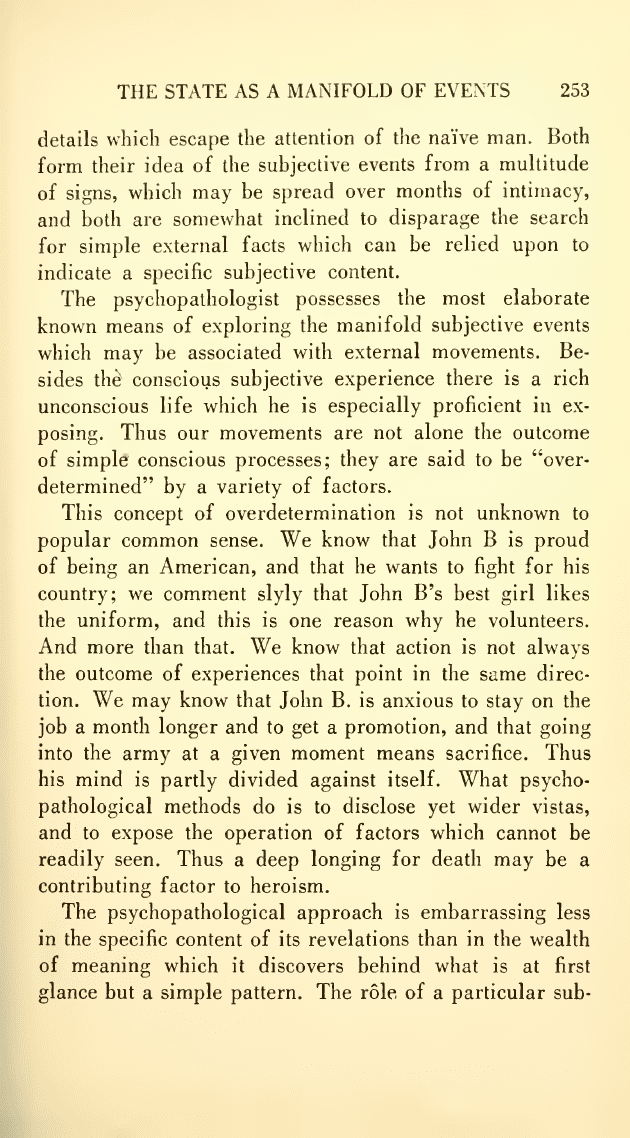
THE
STATE AS A
MANIFOLD OF
EVENTS 253
details
which
escape
the
attention
of the
naive man.
Both
form
their
idea
of the
subjective
events
from
a
muUitude
of
signs,
which may
be
spread
over
months of intimacy,
and
both are
somewhat
inclined to
disparage
the search
for
simple
external
facts
which
can be
relied upon
to
indicate a
specific
subjective
content.
The
psychopathologist
possesses
the most elaborate
known
means of
exploring
the
manifold
subjective
events
which
may be
associated
with
external movements. Be-
sides
th6 conscious
subjective
experience
there is
a
rich
unconscious
life which he is
especially proficient in
ex-
posing. Thus our
movements are
not alone the outcome
of
simple conscious processes;
they are said
to be
"over-
determined" by
a
variety of
factors.
This concept of
overdetermination is not unknown
to
popular common sense. We
know
that
John
B
is
proud
of
being
an
American, and that he wants
to
fight for his
country; we
comment slyly that
John
B's
best girl likes
the
uniform,
and this is one reason why he volunteers.
And more than that. We know
that action
is
not always
the
outcome of experiences that point in the
same direc-
tion.
We may
know
that
John
B, is anxious
to
stay on the
job a
month
longer
and to get
a
promotion,
and that going
into the
army at
a
given
moment
means sacrifice. Thus
his mind
is partly divided against
itself.
What psycho-
pathological
methods
do
is
to
disclose yet
wider
vistas,
and
to
expose the operation
of factors
which
cannot
be
readily
seen. Thus
a
deep
longing for death may
be
a
contributing factor
to
heroism.
The
psychopathological approach is embarrassing
less
in
the specific
content of its
revelations than in the
wealth
of meaning
which it discovers behind what
is at first
glance
but
a
simple pattern. The
role
of
a
particular
sub-
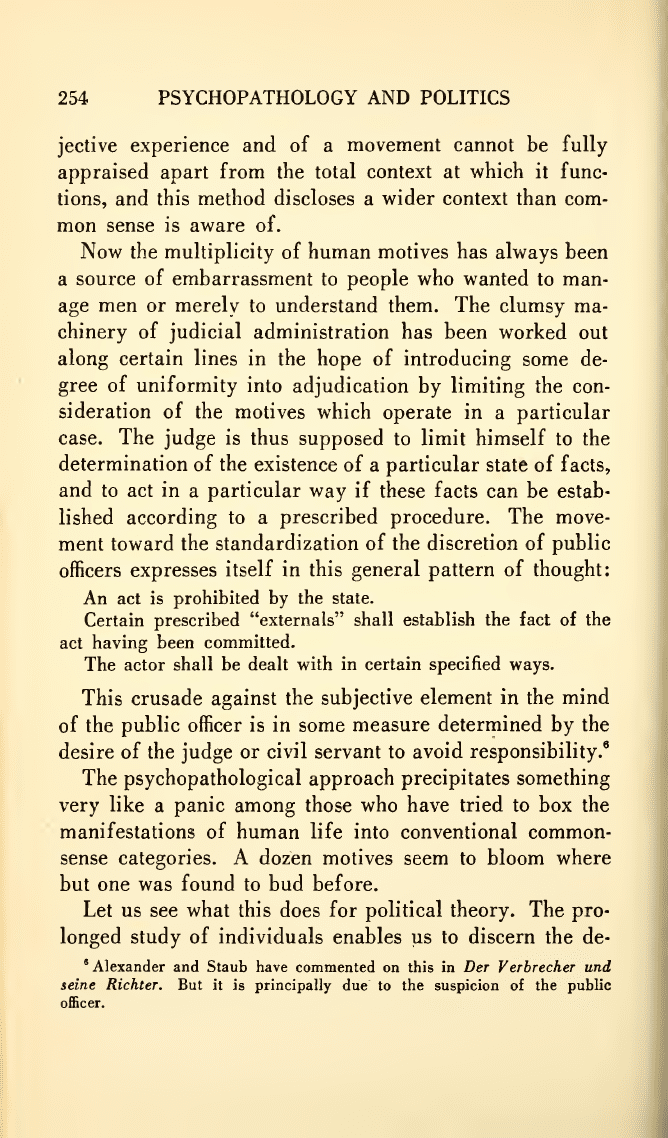
254
PSYCHOPATHOLOGY AND POLITICS
jective
experience and of
a
movement cannot
be
fully
appraised apart
from the total
context
at
which
it func-
tions, and
this method discloses
a
wider
context than
com-
mon
sense is aware of.
Now the multiplicity
of
human motives has
always been
a
source of embarrassment
to
people who wanted
to man-
age
men or merely
to
understand them. The clumsy
ma-
chinery of judicial
administration has been worked
out
along certain lines
in the
hope
of introducing
some
de-
gree of uniformity
into
adjudication
by limiting the con-
sideration of
the
motives which
operate
in
a
particular
case.
The
judge is thus
supposed
to
limit himself
to the
determination
of the existence
of
a
particular
state of facts,
and
to act
in
a
particular
way if these facts can
be estab-
lished according to a
prescribed procedure.
The move-
ment
toward
the standardization
of the discretion of public
officers
expresses
itself
in
this general
pattern
of thought:
An act is
prohibited by
the state.
Certain
prescribed
"externals" shall establish the fact of
the
act
having been
committed.
The
actor
shall be dealt
with in certain specified
ways.
This crusade against
the subjective
element in the mind
of
the
public officer is in some
measure
determined
by
the
desire of
the
judge
or
civil
servant to
avoid responsibility.'
The psychopathological approach
precipitates something
very
like
a
panic
among those
who
have
tried
to box
the
manifestations
of human life into conventional common-
sense
categories.
A dozen motives seem
to
bloom where
but
one was found
to bud before.
Let
us see
what this
does
for political theory. The pro-
longed
study of individuals enables
us to
discern
the de-
°
Alexander
and
Staub
have
commented
on
this in Der Verbrecher
und
seine Richter.
But it is principally
due
to
the suspicion of the
public
officer.
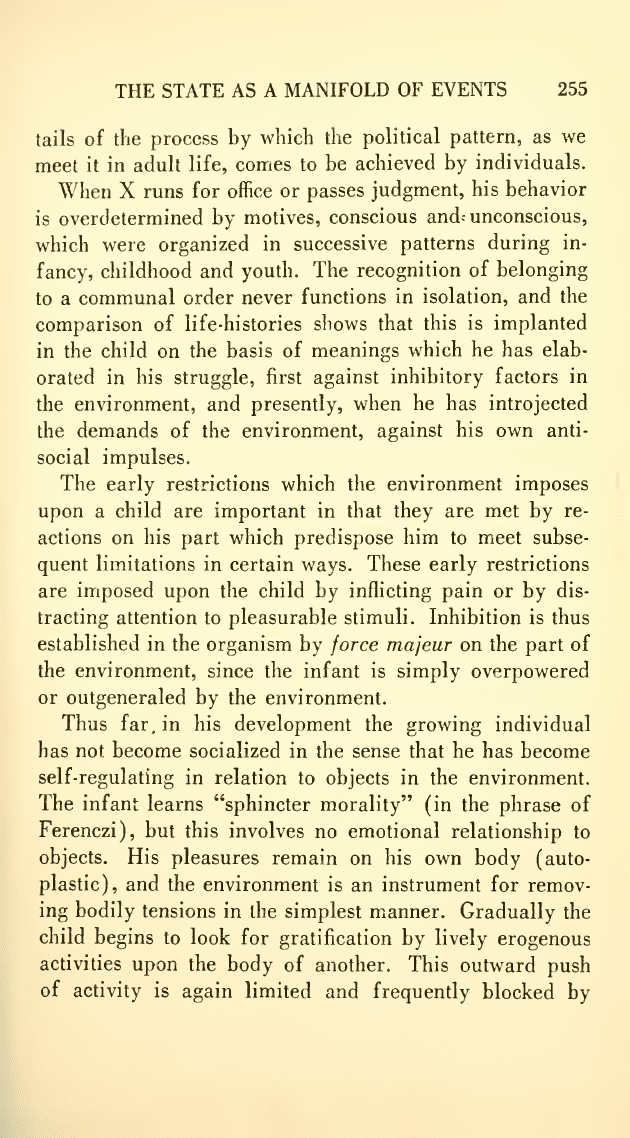
THE
STATE
AS A
MANIFOLD
OF
EVENTS
255
tails
of the
process
by
which the
political pattern, as
we
meet
it in adult
life, comes to
be
achieved
by
individuals.
When X
runs
for
office or
passes
judgment,
his behavior
is
overdetermined by
motives,
conscious and-
unconscious,
which
were
organized
in
successive
patterns
during in-
fancy,
childhood and youth.
The
recognition of
belonging
to
a
communal order
never
functions
in isolation, and
the
comparison of
life-histories
shows that
this is implanted
in
the
child
on the
basis of
meanings
which
he has
elab-
orated
in his struggle, first
against
inhibitory
factors in
the
environment,
and
presently, when
he has introjected
the demands of the
environment, against
his own anti-
social impulses.
The early
restrictions which the
environment imposes
upon
a
child are important in that they are
met
by
re-
actions on his part which predispose him to meet subse-
quent limitations in
certain ways.
These early restrictions
are
imposed
upon the child by inflicting pain or
by
dis-
tracting
attention
to
pleasurable stimuli. Inhibition
is
thus
established
in the organism
by
force
majeur on the part of
the environment, since
the infant is
simply
overpowered
or outgeneraled
by the environment.
Thus far, in his
development
the growing individual
has not become socialized
in the sense that he has become
self-regulating
in relation
to
objects in the environment.
The infant
learns "sphincter
morality" (in
the phrase of
Ferenczi),
but this
involves
no
emotional
relationship
to
objects.
His
pleasures remain
on
his
own
body (auto-
plastic),
and the
environment
is an instrument
for remov-
ing bodily
tensions
in the simplest
mianner.
Gradually
the
child begins
to look for
gratification
by
lively
erogenous
activities
upon the
body
of another. This
outward
push
of
activity
is again
limited
and frequently
blocked
by
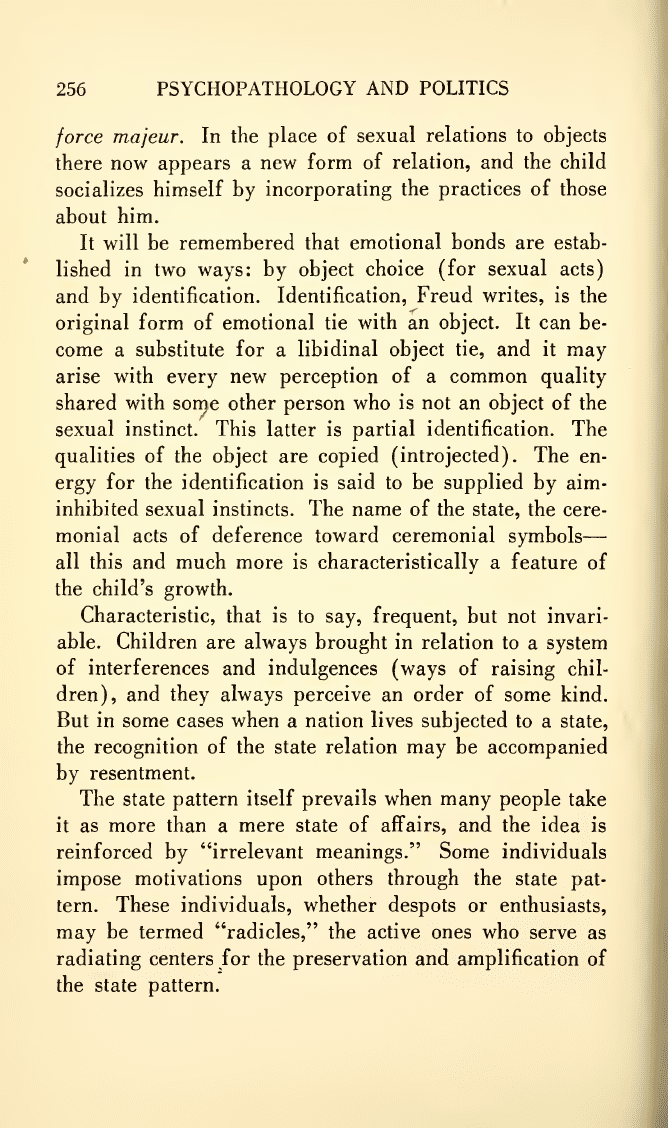
256
PSYCHOPATHOLOGY
AND POLITICS
force
majeur.
In the
place of
sexual
relations
to objects
there now appears a
new
form
of relation, and the child
socializes himself by
incorporating
the practices of those
about
him.
It
will be
remembered that
emotional bonds are
estab-
lished in two
ways: by object
choice
(for sexual
acts)
and by
identification. Identification,
Freud
writes,
is the
original form
of
emotional tie
with
an
object. It
can be-
come
a
substitute
for
a
libidinal object
tie,
and it
may
arise with every new perception
of
a
common
quality
shared with some other
person
who is not an object of the
sexual
instinct. This
latter is
partial identification.
The
qualities of the
object are
copied
(introjected).
The
en-
ergy for the identification is said
to
be supplied
by aim-
inhibited sexual instincts. The name of the state,
the cere-
monial
acts of deference
toward ceremonial
symbols
—
all this
and
much more
is
characteristically
a
feature
of
the child's growth.
Characteristic, that is
to say, frequent,
but not invari-
able. Children are always brought
in relation
to
a
system
of interferences
and indulgences
(ways
of raising
chil-
dren), and
they always perceive
an order of
some kind.
But in some
cases
when
a
nation lives
subjected
to a state,
the recognition of the state relation may
be accompanied
by
resentment.
The state pattern itself
prevails when
many people
take
it as more than
a
mere
state
of affairs, and the
idea is
reinforced by
"irrelevant meanings." Some individuals
impose
motivations
upon
others through the
state
pat-
tern. These individuals, whether despots
or enthusiasts,
may be
termed "radicles,"
the active
ones
who serve
as
radiating centers for
the
preservation
and amplification
of
the state pattern.
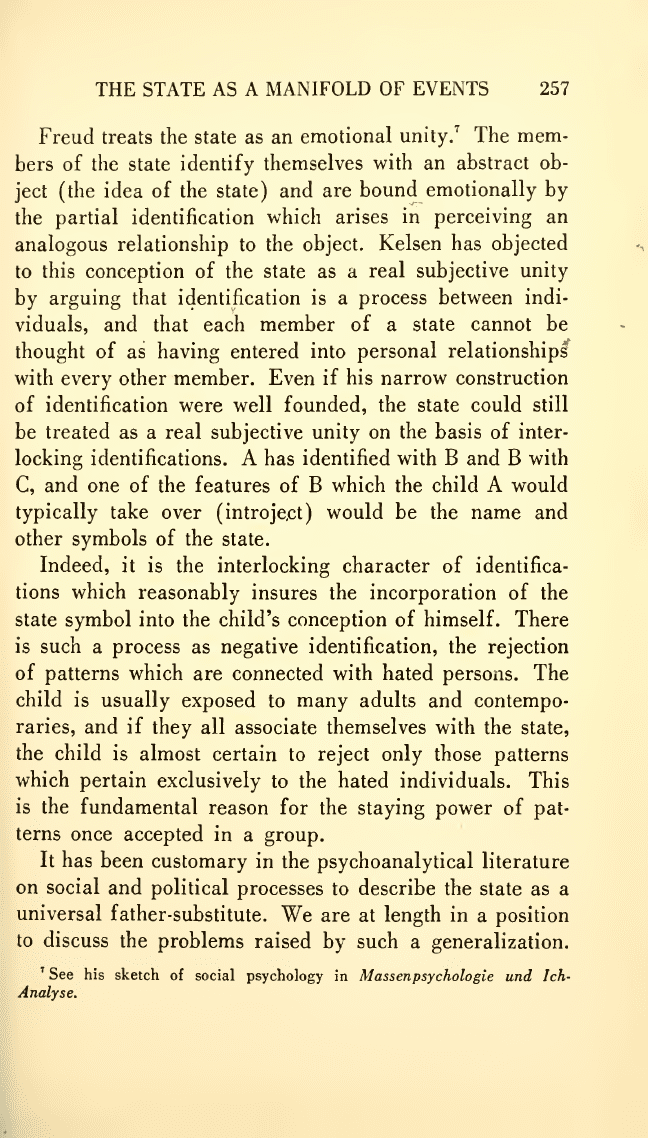
THE STATE
AS A
MANIFOLD
OF EVENTS
257
Freud treats
the state as an
emotional
unity/ The mem-
bers
of the state
identify
themselves
with an abstract ob-
ject
(the
idea
of the state) and
are
bound
emotionally
by
the partial
identification
which arises
in perceiving an
analogous relationship
to
the
object.
Kelsen has objected
to
this
conception of the state as a
real subjective
unity
by
arguing that identification is a
process
between indi-
viduals, and that each
member of
a
state
cannot
be
thought of
as having entered
into
personal relationship!
with every
other
member. Even
if
his
narrow construction
of
identification
were well
founded, the state could
still
be treated
as a
real subjective unity on
the
basis of inter-
locking identifications.
A has
identified with
B
and
B
with
C,
and one of the
features of B
which the child A would
typically take
over (introje.ct) would be the name and
other symbols of
the state.
Indeed, it
is the interlocking
character of identifica-
tions which
reasonably
insures
the incorporation
of the
state symbol into the child's
conception
of himself. There
is such
a process
as
negative
identification,
the rejection
of
patterns which
are
connected with hated
persons. The
child
is usually
exposed
to
many adults
and
contempo-
raries,
and if
they all
associate
themselves with
the
state,
the child
is almost
certain
to
reject only those
patterns
which
pertain
exclusively
to
the hated individuals. This
is
the
fundamental
reason for the staying
power of
pat-
terns
once
accepted in
a
group.
It has
been
customary
in the psychoanalytical
literature
on social
and political
processes
to
describe the
state as
a
universal
father-substitute.
We
are
at
length in
a
position
to discuss
the
problems
raised
by such
a
generalization.
'
See
his sketch
of social
psychology
in Massenpsychologie
und
Ich-
Analyse.
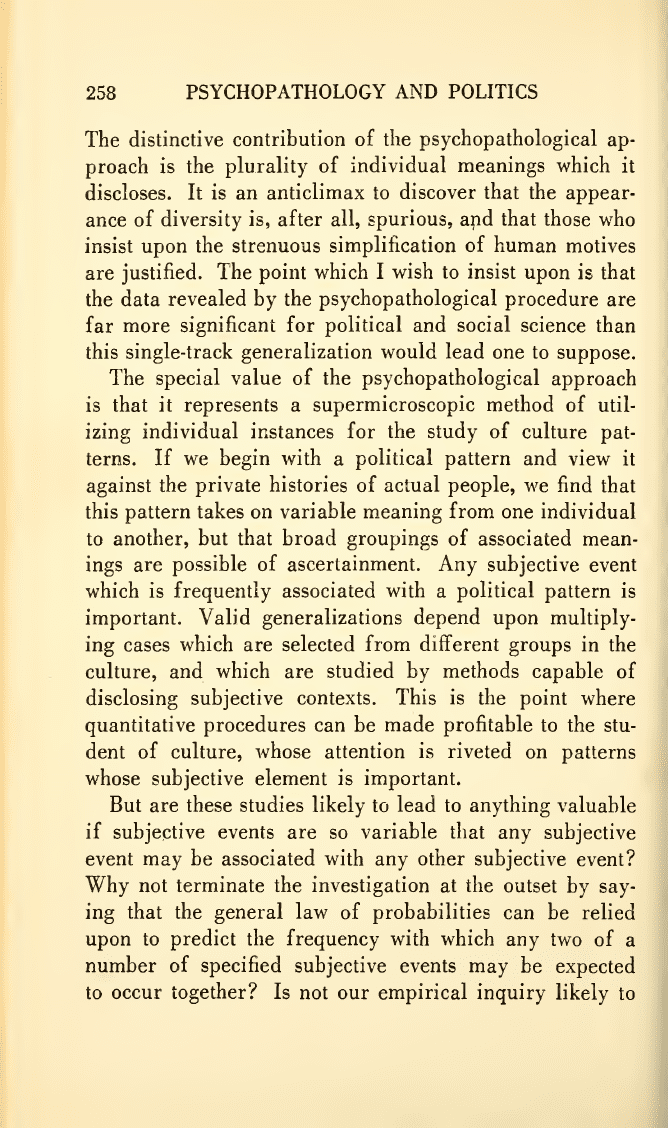
258
PSYCHOPATHOLOGY
AND POLITICS
The
distinctive
contribution
of the
psychopathological
ap-
proach is
the
plurality of
individual meanings
which
it
discloses.
It
is
an
anticlimax
to
discover that the
appear-
ance
of
diversity is, after
all, spurious, and that
those vv^ho
insist
upon
the strenuous
simplification of human
motives
are
justified.
The point which
I
wish to
insist
upon
is that
the
data
revealed
by
the
psychopathological
procedure
are
far
more
significant
for
political and social
science
than
this
single-track generalization would
lead one to
suppose.
The
special value of the psychopathological
approach
is
that it
represents
a
supermicroscopic
method
of util-
izing individual instances
for the study of
culture
pat-
terns.
If
we
begin with
a
political pattern
and view it
against
the
private histories
of actual
people,
we find
that
this
pattern takes on variable meaning
from
one
individual
to
another, but
that broad groupings
of
associated mean-
ings are
possible of ascertainment.
Any subjective
event
which is frequently
associated with
a
political
pattern
is
important.
Valid generalizations
depend
upon multiply-
ing cases
which
are selected
from different groups
in
the
culture, and
which are
studied
by
methods
capable
of
disclosing
subjective contexts.
This is
the point
where
quantitative procedures can be
made profitable
to
the stu-
dent
of culture, whose attention
is riveted
on
patterns
whose
subjective element is important.
But are
these
studies
likely
to
lead
to anything
valuable
if subjective
events
are
so
variable that any
subjective
event may be associated with any other
subjective
event?
Why
not
terminate the investigation
at
the
outset
by
say-
ing that
the general law
of
probabilities
can
be relied
upon to
predict the frequency with which
any
two of
a
number
of specified
subjective events
may be
expected
to
occur
together?
Is
not our
empirical
inquiry
likely
to
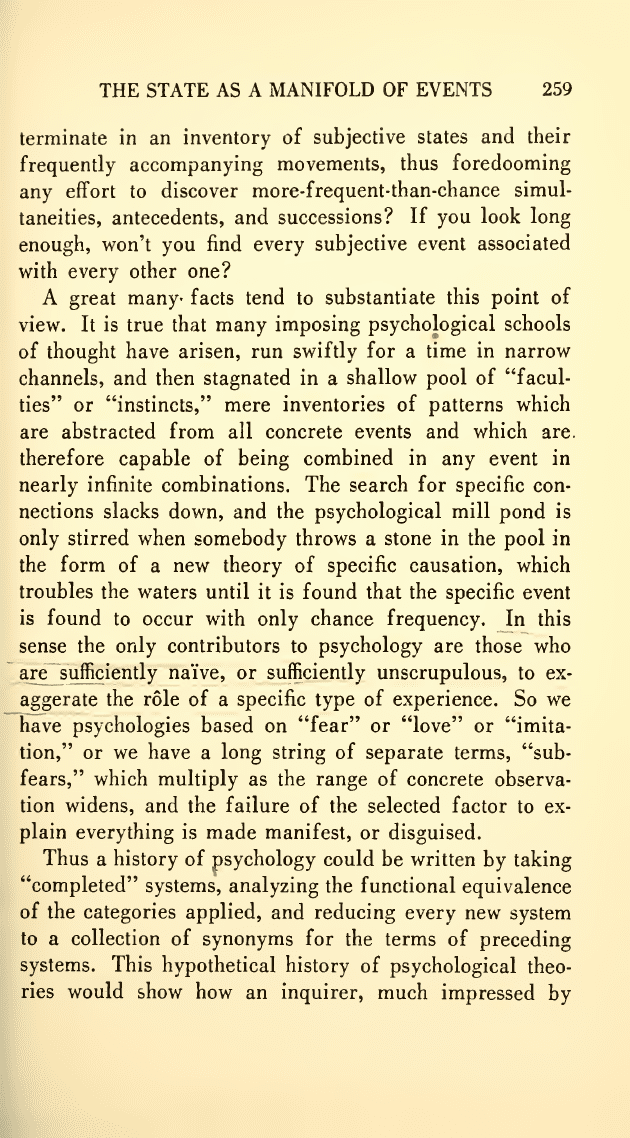
THE
STATE AS
A
MANIFOLD OF EVENTS
259
terminate in an
inventory of
subjective
states and
their
frequently
accompanying
movements,
thus foredooming
any
effort
to
discover
more-frequent-than-chance
simul-
taneities,
antecedents, and
successions?
If
you
look long
enough,
won't
you
find every
subjective
event associated
with every other one?
A
great many- facts
tend
to
substantiate this point of
view. It
is true that many
imposing
psychological schools
of thought have
arisen, run
swiftly for
a
time in narrow
channels, and then stagnated in
a
shallow pool of "facul-
ties" or "instincts," mere
inventories of patterns which
are abstracted
from all concrete events and
which
are.
therefore
capable of
being combined in
any event in
nearly infinite combinations.
The
search for specific
con-
nections slacks
down, and the
psychological mill
pond
is
only
stirred when
somebody throws
a
stone in
the pool in
the
form
of
a
new theory
of
specific causation, which
troubles
the waters until
it is found that
the
specific event
is found
to occur with only chance frequency. In this
sense the only contributors
to
psychology
are those who
are
sufficiently naive,
or
sufficiently
unscrupulous,
to ex-
aggerate the role of
a
specific
type of
experience.
So
we
have psychologies
based on
"fear" or "love"
or "imita-
tion,"
or
we
have
a
long string of separate
terms, "sub-
fears," which multiply
as
the range of concrete
observa-
tion widens,
and the failure of the selected
factor
to
ex-
plain
everything
is made manifest,
or
disguised.
Thus
a
history
of
psychology
could
be written
by
taking
"completed" systems, analyzing
the functional
equivalence
of the
categories applied,
and reducing every
new system
to
a
collection of synonyms
for
the terms of
preceding
systems. This
hypothetical history
of
psychological
theo-
ries
would show
how
an
inquirer,
much
impressed
by
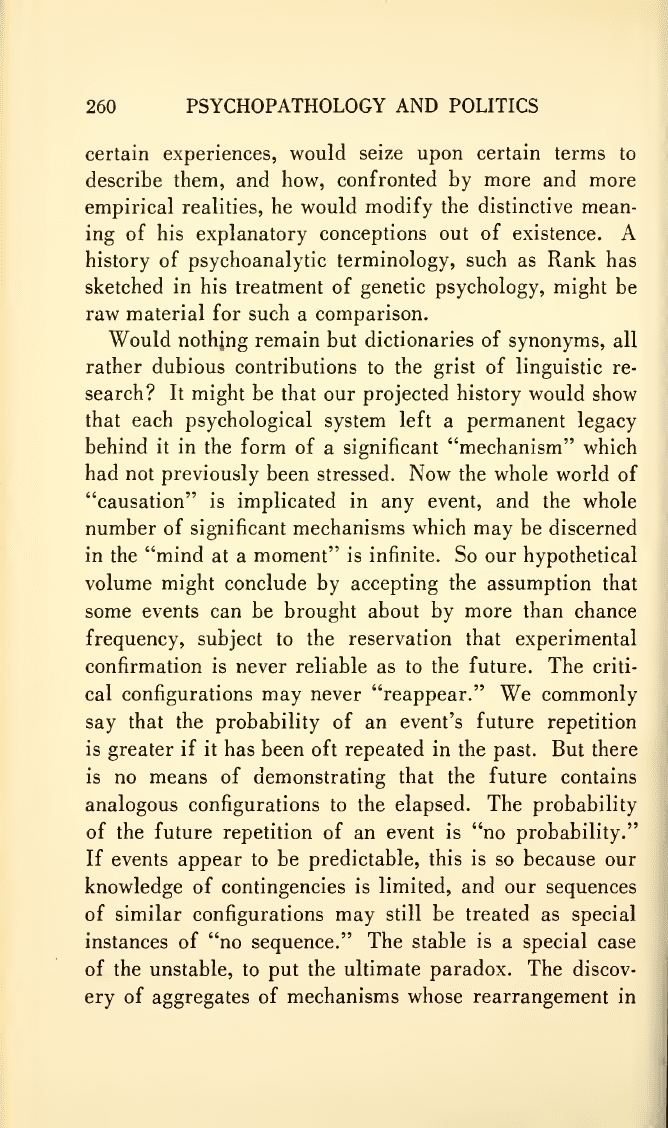
260
PSYCHOPATHOLOGY AND POLITICS
certain
experiences, would
seize upon certain
terms
to
describe
them,
and
how,
confronted by more and
more
empirical
realities,
he
would
modify the distinctive
mean-
ing of his explanatory
conceptions out
of
existence. A
history of
psychoanalytic terminology, such
as Rank has
sketched
in
his treatment of
genetic psychology,
might
be
raw material for such
a
comparison.
Would
nothing
remain but
dictionaries of
synonyms,
all
rather
dubious contributions
to
the grist of linguistic
re-
search? It might
be
that
our
projected history
would show
that each psychological
system left
a
permanent legacy
behind it in
the form of
a
significant
"mechanism" which
had
not
previously
been stressed. Now the whole
world of
"causation" is
implicated in any event, and the whole
number of significant
mechanisms which
may be discerned
in
the "mind
at a
moment" is
infinite.
So our hypothetical
volume
might
conclude by accepting
the
assumption that
some events can be brought about by
more
than chance
frequency, subject to the
reservation
that experimental
confirmation
is
never
reliable as to the
future.
The criti-
cal
configurations may never
"reappear."
We
commonly
say that
the
probability of an
event's future
repetition
is
greater
if
it has been oft repeated in the
past. But
there
is
no means of demonstrating
that the future contains
analogous
configurations
to
the elapsed. The probability
of the future repetition
of an
event is
"no
probability."
If events
appear to be
predictable,
this is
so because our
knowledge of contingencies is
limited, and
our sequences
of similar configurations
may
still be treated
as
special
instances of "no sequence."
The stable
is
a
special
case
of the unstable,
to put
the ultimate
paradox.
The discov-
ery of aggregates
of mechanisms whose rearrangement
in
